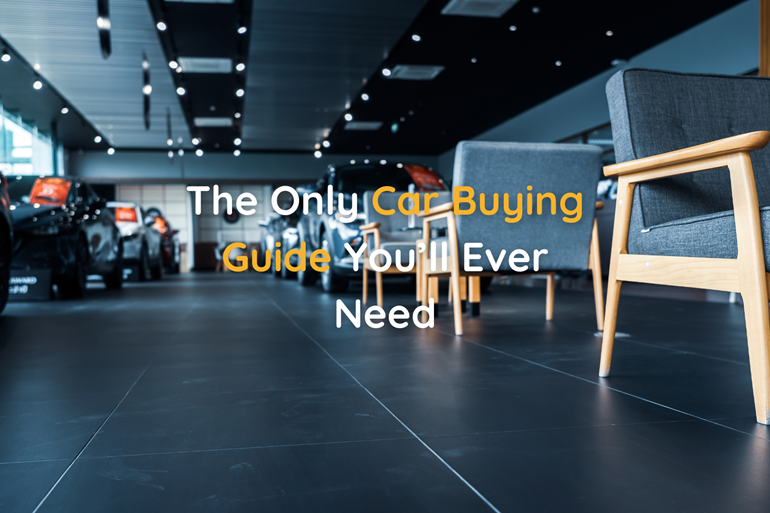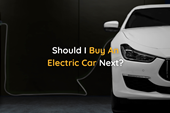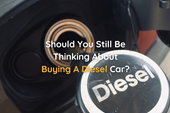
The Only Car Buying Guide You'll Ever Need
Make Car Buying A Breeze With Our Complete Guide…
Ditching your old car and moving into a new set of wheels is always exciting, whether you’re a major petrol-head or just see cars as a means from A to B it’s hard not to be swept away by the idea of something shiny and new. After all, who doesn’t love that new car smell?
That said, cars are generally one life’s bigger purchases and, if you’re buying brand-spanking new, will be one of the more costly items too. With the average price for a new car in the UK now topping £39000, you must get the buying right, ensuring you’re happy with your new car long term without suffering major buyer’s remorse.
In this guide, we're covering every aspect of car buying, from initial research to negotiation to help your car buying journey that little bit easier.
Here’s our complete guide to buying a new car…
Quick Links
- Should You Buy A New Or Used Car?
- What Should You Expect To Pay?
- Car Depreciation Calculator
- Car Buying Checklist
- How Are You Going To Finance Your New Car?
- Buying A Car Online Vs Buying A Car In A Dealership
- Visiting A Dealership
- The Final Word
Should You Buy A New Or Used Car?
First things first, do you need a new car, or new to you?
Before you start your car-buying journey it’s important to understand the differences between buying a brand-new car (made for you by the manufacturer) and a used car.
Here’s a quick overview of the benefits of both:
Buying A New Car:
- Specification: Tailor the specification to your needs, with added options such as colours, interior trim and extra gadgets.
- History: There’s no need to worry about the car’s history; it’s brand new!
- Purchasing: There are usually extra purchasing options on new cars such as personal contract hire, which can benefit some buyers.
- Pricing: Pricing tends to be more fixed, which means you don’t need to ‘haggle’ over ambiguous prices.
- Warranty: Generally, new cars come with a longer warranty, usually between 3-5 years.
- Safety: Thanks to the advances in car technology, new cars are generally safer (in terms of NCAP ratings) than older models.
Buying A Used Car:
- Affordability: Buying used can really keep costs down, with new cars losing anywhere between 15-50% of their value within the first three years.
- History: Conversely, this makes it onto both lists. If you buy used you can often get a full service history with your car, which tends to offer peace of mind.
- Better Negotiation: Unlike new cars, buying used generally means more wiggle room on pricing, if you’re a good talker you could drive a better bargain.
- Lead Times: New cars may not always be readily available, especially if you’ve opted for a more niche finish or spec. Most used cars can be purchased and collected within a week or two.
What Should You Expect To Pay (And Resell) Your New Car For?
As we said earlier, the average price for a new car in the UK is around £39000, let’s break that down a little…
Average Prices For Hatchbacks & Small Cars
According to Nimblefins, the average price for a new ‘small car’ (hatchback) in the UK has risen around 46% since 2022 to just over £22000 for a new model, with the average used hatchback being around £16000 (Statista data from 2022).
What’s more astonishing is the average drop in value; with the three big German manufacturers seeing an average drop of around 33% in the first year of ownership alone for their respective new car offerings.
Whilst there are several mitigating factors, expect to sell your new car for approximately half what you pay for it, if you keep it for three years.
Average Prices For Medium Cars, Family Hatchbacks and Smaller Family Saloons
Based on the UK’s best-selling mid-sized cars, the average price you’ll pay for a new medium, family hatchback or saloon car is around £27500; a rise of about £4K in the last four years.
If you’re opting for a used model, you should expect to pay £21000, based on the average used price of three vehicle types within this bracket (MPV, Saloon and larger Hatchbacks).
Average Prices For Larger Saloons & SUVs
If you’re considering an SUV you’re in good company; as it’s the fastest-growing vehicle type in the UK, outside of EVs, increasing by 37.3% in 2023.
The average starting ‘On The Road’ price for a new SUV is £30973, with a used model costing £23-£24000.
As with most vehicle types, SUVs lose an average of 15-25% in their first year, rising to 50% after three; something to factor in, long term, when you're making your decisions.
Managing Depreciation
Unfortunately, depreciation is pretty common, unless you're buying an ultra-rare collectors item or something that suddenly skyrockets in popularity. If you're involved in an accident, your car is stolen or damaged and declared a 'total loss' however, you can take some steps to mitigate your risk.
Further research on Gap Insurance is a must if you're looking for a new (or used) car and want that added peace of mind. You can read more about it on our blog; 'How Does Gap Insurance Work' too.

Depreciation Calculator
You can estimate the total amount of depreciation your car will experience using our free Car Depreciation Calculator.
Think About Your Car Buying Checklist
Once you’ve got a realistic idea of whether you’ll buy new or used, with a firm budget in mind, it’s time to put together your ‘Nice To Have’s’ and ‘Must Haves’, building your ideal car buying checklist.
What works for a new driver might not be ideal for a family of 5, whereas someone doing short journeys around town probably won't need the same type of car features as those doing daily motorway commutes.
New Car Checklist
Here are a few suggestions to get you started:
| Consideration | Factors |
Best For |
|
Fuel & Power Type |
Whilst diesel and petrol cars are being phased out, they’re still going to be around for a while. Do you prefer the future-proof nature of an EV, or are you happier sticking with ‘fossil fuels’ in search of a bargain and familiarity? |
|
|
Driving Style |
Does driving excite you, or do you see it as a chore? Understanding your driving style should influence your car purchase, opting for luxury, comfort or performance depending on your preference. |
|
|
Driving Needs |
Possibly the biggest consideration factor on our list is your driving needs. Do you need a car for the daily commute? Do you envisage plenty of motorway driving or will it only be short bursts? Choosing a car that matches your driving needs is key to happy motoring and avoiding that post buyer's remorse. |
|
|
Running Costs |
When thinking about running costs, be sure to go beyond fuel, road tax and car insurance. MOTs and servicing charges can vary wildly depending on the car you choose, with luxury, high-powered cars and EVs generally having higher parts and labour costs. |
|
|
Features & Technology |
Do you need a sat nav, hands-free Bluetooth technology or DAB radio? Whilst added extras are nice to have, they can quickly increase the overall cost and your monthly repayments. |
|
|
Size |
Smaller cars are renowned for tootling around town, but they aren’t for everyone. If you have a family or regularly need to move bigger items (such as sports equipment, prams or office equipment) you’ll probably need something bigger such as an estate or SUV. |
|
How Are You Going To Finance Your New Car?
Once you’ve figured out what’s important to you when it comes to your next car, it’s time to think about how you’ll buy it, which, at first glance, seems like an absolute minefield. With dealerships becoming more competitive and online options ever-growing, there seems to be a never-ending list of financing options available, which can be overwhelming.
Don’t worry though, ultimately, the most popular ways to buy a car (new or used) have remained the same. Let’s take a look…
HP: Hire Purchase
Hire purchase is the most straightforward of all financing options, essentially, using a ‘car loan’ to fund your purchase, which you repay every month.
With hire purchase, you own the car at the end of the term. In most cases, it’s up to you how much deposit (if any) you pay at the start of the agreement, keeping in mind that, the lower the deposit, the higher your monthly repayments will be.
PCP: Personal Contract Purchase
PCP stands for ‘Personal Contract Purchase’ and is one of the most popular ways to finance a car; available on both new and used models.
Typical PCP deals usually last between 3-5 years, requiring an initial deposit and monthly repayments. Unlike Hire Purchase, where monthly repayments cover the total finance balance, PCP ‘offsets’ some of the balance to the end of the finance term, generally meaning lower monthly repayments.
At the end of the agreement you usually have three options:
- Hand the car back: Choose not to pay the offset ‘Optional Final Payment’ (also known as a ‘balloon payment’) and you can hand the car back and walk away without any credit or financial penalty.
- Buy the car outright: Choose to pay the Optional Final Payment and you’ll own the car outright.
- Trade in: Trade in your vehicle and, if there’s any equity (factoring in the Optional Final Payment) you can use it towards your next car.
There are a few important things to remember if you’re considering PCP, for instance, the amount you pay (including the forecasted final payment) is calculated using your average annual mileage; going over this at the end of the term will almost always result in a surcharge per mile.
Damage can also be a bigger concern with PCP (as opposed to Hire Purchase) as, aside from general wear and tear, you’ll be responsible for the condition of the vehicle at the end of the agreement; meaning you’ll have to ‘make good’ any problems that affect the car's value.
In most cases, these are only small issues and shouldn’t put you off a PCP if it’s right for you. However, if you do want extra peace of mind; consider Scratch & Dent Insurance and Tyre & Alloy Wheel Insurance, which can help protect you against smaller, everyday damage.
Read More: How To Prepare Your Car For An End Of Term PCP Inspection
PCH: Personal Contract Hire
PCH, more commonly known as Leasing is rapidly growing in popularity as the preference for outright car ownership declines, coupled with a growth in online ‘Lease Only’ retailers.
Unlike both PCP and HP, with leasing there’s no option to own the car outright. What’s more, leasing is only offered on new cars.
Often preferred for it’s simplicity, leasing involves paying an initial rental (typically 3-6 months worth of payments), followed by a fixed monthly cost; with terms usually ranging from 2-4 years. Whilst you don’t ever own the car, you can usually get into a new car for less as you’re often only covering the initial depreciation, as opposed to HP, for instance, where your monthly repayment covers the vehicle’s total value.
As with PCP, it’s worth remembering that mileage limits and damage can be an issue, so be sure to do your homework.
Buying A Car Online Vs Buying A Car In A Dealership
Nowadays you don’t even need to visit a dealership to buy your car if you don’t want to; with online retailers making car buying so easy, you can do it from your sofa! That said, both car buying online and in dealerships comes with it’s own unique set of pros and cons, let’s check them out:
Buying Online:
- Less stress: You can buy your car without the ‘hassle’ or pressure of a sales environment.
- Easier to research: With the internet at your fingertips, it’s easier to research each make and model more thoroughly.
- Cost-driven approach: By physically taking the car out of the equation, you can often shop based on price, meaning you’ll often get a better deal online.
- Better prices and deals: Following on from the cost driven approach, online retailers don’t have the same overheads as dealerships, which means they often undercut their bricks and mortar competitors.
Buying In A Dealership:
- See the car: Whilst online sellers, including manufacturers, now offer a number of virtual reality options, such as 3D tours, nothing beats getting behind the wheel of the car you're thinking of buying.
- A broader range of options: Sometimes when visiting a dealership to look at one car, you may be fully taken by another, something which can be a benefit.
- Better knowledge: Contrary to popular belief, salespeople work best when they find what’s right for you. Visiting a dealership is a great way to ask as many questions as you need to, often receiving excellent technical and professional advice.
- The opportunity to haggle: If you’re confident, you could potentially get a better deal by haggling, but we do have to say; with more transparency, the days of mega deals are few and far between.
Read More: For more information, read our article on the Pros & Cons Of Buying A Car Online.
Consider A Blended Approach
So which is truly better? Our advice is to adopt a blended approach, doing your initial research online (keeping your checklist in mind), mixed with visiting a dealership to see your chosen car ‘in the flesh’.
Keep in mind, dealerships like to move their stock as quickly as possible, so you won’t have unlimited shopping time, particularly if you’re considering a used car. Be decisive.
Visiting A Dealership
Armed with your knowledge of financing options and your ideal car checklist it’s time to buy! If you’ve decided to purchase via a dealership it’s wise to plan your journey ahead of time to ensure maximum success.
A quick word of experience though; don’t be too nervous, dealerships are a far cry from the daunting days of heavy sales and pressure tactics. Salespeople these days have to adhere to much stricter rules and usually aim to find the right car for you, so you’re happy; after all, word of mouth is key.
With that in mind, approach your dealership visit for what it is; a rare, enjoyable and fun experience.
Do Your Research
Aimlessly driving from one dealership to another is a sure-fire way to waste your day, look at the wrong cars and potentially end up with a bad deal.
Before you head out, research the vehicle make and model(s) you’re willing to consider online and make an itinerary of each dealership you’ll need to visit.
If you’re going to trade in or ‘part exchange’ your current car, be sure to research the Glass Guide, try online car buying sites like We Buy Any Car and look at cars similar to yours on Autotrader for an estimate of how much you could be offered for yours. Remember, dealerships have to earn a living too, so be prepared to negotiate reasonably.
In a lot of cases, dealerships will be inclined to offer you a deal if it secures your business (before you go elsewhere); something to consider.
Go With A Budget In Mind
Looking at and test-driving a shiny new car is an emotive experience, which is where budget creep comes in.
Whilst you’re happily driving along, agreeing to wheel upgrades, technology packs and that must-have stereo, your monthly finance costs are steadily increasing.
Going with a firm budget bracket in mind (such as £250-£300) allows you some wiggle room for any unexpected luxuries you’d like, whilst still keeping you happy, post-purchase, when the reality of repayments sets in.
Be Open To Discussion & Be Honest
As we’ve said already, the days of pressure selling are pretty much gone, so it pays to work with your car salesperson to find the perfect car for you.
A good salesperson will get to know you, your needs and ‘nice to haves’, to do that, they should be asking plenty of open ended questions; answering as honestly as you can will help you make the best decisions on your new car.
You can always keep some information to yourself, such as your maximum budget, or the amount you’d like for your part exchange (which, if they ask, is a poor question for all involved anyway), but on the whole, it’s better to be open minded and transparent.
Be Decisive But Not Pressured
Unfortunately, dealerships only earn money when they sell cars, which means they don’t want to keep vehicles on their forecourt for any longer than necessary; they certainly won’t ‘keep hold’ of a car for days or weeks until you make your mind up.
That means you need to be prepared to buy, if you feel you’ve found the right car and the right deal. Most dealerships can offer a deposit basis, which does give you a day or two wiggle room to think at home.
On the other hand, don’t make any purchase if you’re unsure or feeling pressured. Pressure selling goes against Financial Conduct Authority rules and is unethical.
Be prepared to walk away if the deal doesn’t feel right.
The Final Word
We hope we've helped break down the seemingly daunting task of car buying into manageable chunks.
As long as you do your initial research (which is much easier thanks to smartphones and the internet), have a budget in place and an open mind, you'll not go far wrong.
Ultimately, enjoy the process, it should be a fun, exciting time after all!
Enjoyed reading? Share with your network or share our infographic below!














